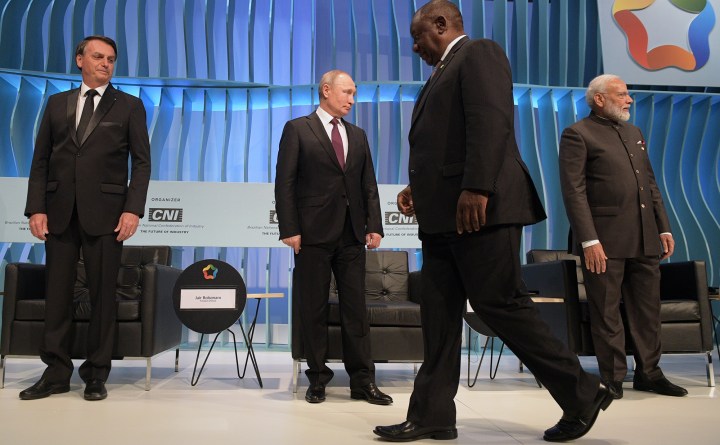BUSINESS REFLECTION
After the Bell: The future of BRICS lies in its selection of new members

Many people within the ANC want the BRICS grouping to become the big voice of what you might call ‘the anti-West’. Attracted by this notion, a bunch of global disaster cases run by autocrats that have the same motivation at the core of their foreign policy want to join.
With the BRICS Summit happening in Sandton later this month, I’d like to pose a pretty simple question: What would be the worst possible, or the best possible, outcome?
But first, I suspect a little background is necessary. I think this BRICS (Brazil, Russia, India, China and South Africa) meeting is happening at a crucial juncture for several different reasons.
The thing is, it’s increasingly obvious that the world’s three major global structures – the G7, the G20 and the United Nations – are kinda broken.
The G7 group of countries is broken because it no longer represents the world’s leading economies. The G7 is indeed powerful and very cohesive. But Financial Times columnist Martin Wolf points out that between 2000 and 2023, the G7’s share in global output (at purchasing power) will have fallen from 44% to 30%, while that of all high-income countries will have fallen from 57% to 41%. For some emerging and developing countries, China is a more important economic partner than the G7; Brazil is one example, Wolf writes.
The person who initiated the idea of the BRIC (without the S) group, former Goldman Sachs exec Jim O’Neill, is even more scathing. In a recent interview in African Business, he said, “The whole idea that this group of seven ‘industrialised’ or ‘more developed’ or ‘earlier developed’ countries can run the world is embarrassing. Because, first of all, their share of the world GDP has declined. Japan’s not shown any net increase in its GDP for 20 years. Italy virtually never grows. So, this idea that they are some kind of thing for the whole world to follow is erroneous.”
What about the G20? Wolf’s assessment is simply that the G20 fails because the whole notion of a cooperative global economic order has disappeared. He’s gloomy. “Hopes of a co-operative global economic order, which reached their zenith at the G20 London summit of April 2009, have evaporated,” he writes.
Personally, I’m more hopeful for the G20 grouping: it’s small enough to have some kind of loose coherence, at least on globally important issues. But it’s big enough to offer tangible support for certain issues and to create a sense of global heft around them. But Wolf’s point cannot really be gainsaid: it’s currently a very, very difficult structure to manage.
The G20’s big advantage is that it’s not the United Nations, which is irritatingly and depressingly stuck in the post-war structure. The UN is a cacophony of voices and it’s bound up in the most ludicrous structures and formalities, which results in things like the UN Human Rights Council being represented by flagrant human rights abusers. The veto powers granted to members of the UN Security Council, so logical after World War 2, are now just nonsense.
Do the UN agencies do any better? In many cases, I think they do. The UN is sometimes helpful in the process of building peace (often not so much), but beyond that, it’s too complicated and conflicted to be a useful tool in global advancement. It’s noteworthy how absolutely absent the UN has been in the Russia-Ukraine situation as a negotiating force.
Into this relative impasse, the BRICS grouping is suddenly thrust. South Africans should be aware that a huge amount of what is about to happen at the BRICS conference is going to be symbolic, and symbolic only. The assemblage itself is now massively complicated by Russia’s prominence within it, and Russia’s invasion of Ukraine — as President Cyril Ramaphosa has discovered.
And there is a new problem — and this relates to the direction the group intends to take. Many people within the ANC want the BRICS grouping to become the big voice of what you might call “the anti-West”. Attracted by this notion, a whole bunch of global disaster cases run by autocrats that have the same motivation at the core of their foreign policy want to join. At the front of that queue is Iran, but also Cuba, Venezuela and Zimbabwe have also expressed interest. Can you imagine?
If the group were to allow them to join, it would really signal the end of BRICS as a serious organisation. As it is, it’s hard enough to characterise it as such. As O’Neill challenged in his interview, “Tell me something that China and India ever agree on.” Add Belarus, Bangladesh and Saudi Arabia to the mix — all of whom have formally asked to join — and things are going to start looking very, very messy.
That would be the “ideology-first” approach. But there may be another outcome, which would require looking back to the basis on which the group was initially conceived: large countries which will have, in time, some serious economic clout. If that is the criteria, then the new entrants should be Egypt, Ethiopia, Indonesia and Nigeria, with the possible addition of Argentina, Bangladesh, Saudi Arabia and Iran. Or none of the above.
You might call that the logic-first approach. If that happens, I think the BRICS grouping might in time have some role to play. If not, it won’t. DM















 Become an Insider
Become an Insider
Comments - Please login in order to comment.